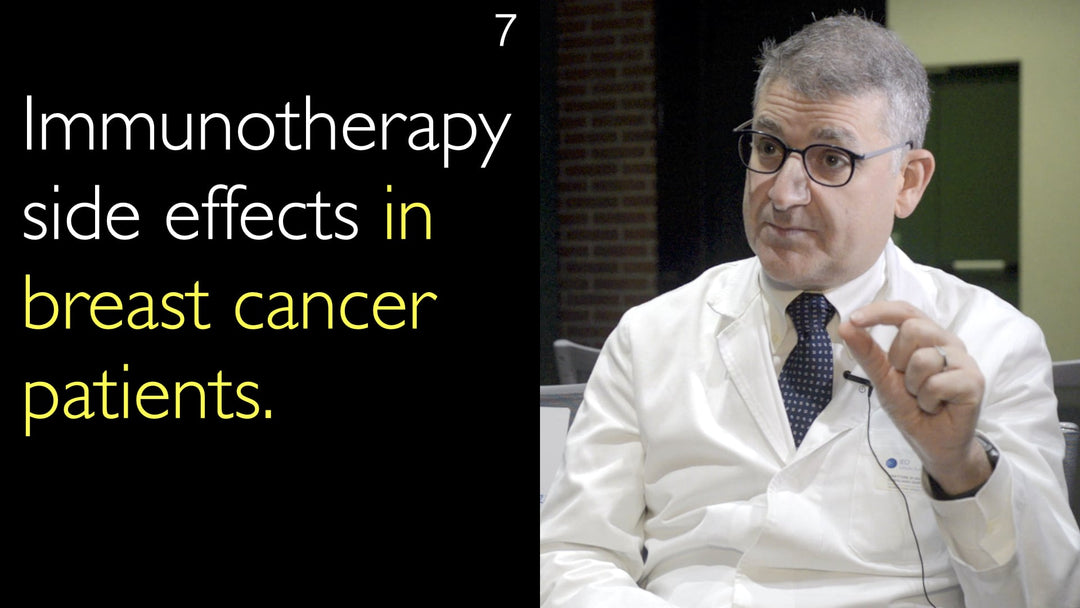O principal especialista em imunoterapia para câncer de mama, Dr. Giuseppe Curigliano, explica os efeitos colaterais mais frequentes dos inibidores de checkpoint imunológico, como erupções cutâneas, hepatite e colite. Ele detalha como essas reações autoimunes são tratadas com corticosteroides e interrupções temporárias do tratamento, ressaltando que a maioria é reversível e não impede a continuidade de uma terapia oncológica eficaz. Dr. Curigliano enfatiza a importância do reconhecimento precoce e da orientação ao paciente para alcançar excelentes resultados, evitando complicações de longo prazo.
Tratamento dos Efeitos Adversos da Imunoterapia no Câncer de Mama
Navegar para a Seção
- Efeitos Adversos Comuns da Imunoterapia
- Manejo das Reações Autoimunes
- Reversibilidade e Continuação do Tratamento
- Resistência Tumoral versus Efeitos Adversos do Tratamento
- Educação do Paciente e Desfechos Clínicos
- Respondedores Excepcionais e Sobrevida em Longo Prazo
Efeitos Adversos Comuns da Imunoterapia
Pacientes em imunoterapia para câncer de mama frequentemente apresentam reações autoimunes. O Dr. Giuseppe Curigliano, MD, aponta como efeitos adversos comuns erupções cutâneas, hepatite e colite. A pneumonite, embora mais rara, é uma complicação potencialmente grave da terapia com inibidores de checkpoint imunológico.
Esses efeitos ocorrem porque a imunoterapia ativa o sistema imunológico do paciente para atacar as células cancerígenas. Essa maior atividade imunológica pode, por vezes, atacar erroneamente tecidos e órgãos saudáveis, resultando em inflamação.
Manejo das Reações Autoimunes
O manejo eficaz dos efeitos adversos da imunoterapia depende do reconhecimento precoce e da intervenção imediata. O Dr. Giuseppe Curigliano, MD, ressalta a importância crucial de conscientizar os pacientes sobre os possíveis sintomas. O protocolo padrão envolve iniciar um curso de corticosteroides e suspender temporariamente a imunoterapia assim que um efeito adverso é detectado.
Essa abordagem permite que o sistema imunológico se estabilize e a inflamação diminua. Para efeitos adversos específicos, como a tireoidite — mais comum em mulheres —, pode ser necessário um tratamento de reposição hormonal tireoidiana a longo prazo para controlar o hipotireoidismo resultante.
Reversibilidade e Continuação do Tratamento
Uma preocupação comum entre os pacientes é se os efeitos adversos serão permanentes. O Dr. Curigliano confirma que muitos dos efeitos induzidos pela imunoterapia são, de fato, reversíveis. Após o controle e a resolução do efeito adverso, os pacientes geralmente podem retomar o tratamento do câncer de mama.
Essa possibilidade de reiniciar a terapia é fundamental para manter os benefícios antitumorais dos inibidores de checkpoint imunológico. Em entrevista, o Dr. Anton Titov, MD, esclarece que a interrupção temporária do tratamento não implica necessariamente perda de eficácia terapêutica.
Resistência Tumoral versus Efeitos Adversos do Tratamento
O Dr. Giuseppe Curigliano, MD, faz uma distinção importante entre o desenvolvimento de resistência à imunoterapia e a ocorrência de seus efeitos adversos. Ele observa que, em sua prática clínica, não vê muitos efeitos adversos graves, atribuindo isso ao uso adequado e à educação do paciente.
A progressão do câncer geralmente ocorre porque o tumor desenvolve resistência ao mecanismo de tratamento, e não porque a terapia foi interrompida devido a efeitos adversos. São dois desafios clínicos distintos, que exigem estratégias de manejo diferentes.
Educação do Paciente e Desfechos Clínicos
O Dr. Giuseppe Curigliano, MD, destaca que a educação é uma ferramenta poderosa para melhorar os desfechos. Ao conscientizar os pacientes sobre possíveis efeitos adversos, eles podem relatar os sintomas precocemente, permitindo uma intervenção mais rápida. Essa abordagem proativa ajuda a evitar que os efeitos adversos se agravem.
Esse foco na parceria com o paciente é um pilar fundamental dos cuidados oncológicos modernos. O Dr. Anton Titov, MD, ressalta a importância dessas discussões durante o planejamento do tratamento, para estabelecer expectativas realistas e empoderar os pacientes.
Respondedores Excepcionais e Sobrevida em Longo Prazo
A conversa com o Dr. Anton Titov, MD, também aborda o espectro de respostas dos pacientes. O Dr. Giuseppe Curigliano, MD, relata que teve respondedores excepcionais, incluindo alguns pacientes com câncer de mama metastático que estão vivos há mais de dez anos após a imunoterapia.
Esses casos atípicos ilustram o enorme potencial da imunoterapia para alcançar remissão duradoura a longo prazo. Por outro lado, alguns pacientes, especialmente idosos, podem desenvolver resistência rapidamente e ter um desfecho menos favorável, evidenciando a variabilidade da resposta ao tratamento.
Transcrição Completa
Dr. Anton Titov, MD: Pacientes prestes a iniciar imunoterapia, inclusive para câncer de mama, frequentemente perguntam: quais efeitos adversos provavelmente vou sentir? Quais são os efeitos adversos mais comuns da imunoterapia em pacientes com câncer de mama que você observa em sua prática clínica?
Dr. Giuseppe Curigliano, MD: Geralmente, as reações autoimunes são os efeitos adversos mais comuns da imunoterapia. Incluem erupção cutânea, hepatite e colite. Raramente, pode ocorrer pneumonite.
Atualmente, sabemos como manejar os efeitos adversos dos inibidores de checkpoint imunológico. É essencial reconhecê-los precocemente e conscientizar os pacientes. Identificado o efeito adverso, iniciamos corticosteroides e interrompemos o tratamento. É possível recuperar-se completamente, sem sequelas a longo prazo.
Às vezes, pode ocorrer tireoidite, mais comum em mulheres. Nesses casos, é necessário iniciar terapia de reposição hormonal tireoidiana.
Dr. Anton Titov, MD: No caso dos inibidores de checkpoint imunológico, a maioria dos efeitos adversos é reversível? É possível retomar a terapia após controlar os efeitos adversos com corticosteroides?
Dr. Giuseppe Curigliano, MD: Muitos são reversíveis. Geralmente, após controlar o efeito adverso, é possível dar continuidade ao tratamento do câncer de mama.
Dr. Anton Titov, MD: Em pacientes com câncer de mama, você costuma observar resistência à imunoterapia que leva à interrupção do tratamento? Ou os efeitos adversos surgem mesmo quando a imunoterapia continua agindo contra o tumor?
Dr. Giuseppe Curigliano, MD: Nunca observei efeitos adversos muito graves da imunoterapia em meus pacientes. Talvez porque saibamos como usar a imunoterapia e tenhamos investido na educação dos pacientes.
Alguns pacientes serão respondedores excepcionais. Tive casos de doença metastática em que os pacientes estão vivos há mais de dez anos. São situações atípicas, que não consigo explicar.
Alguns pacientes idosos, é claro, podem desenvolver resistência muito rapidamente. Esses pacientes têm um desfecho desfavorável.





